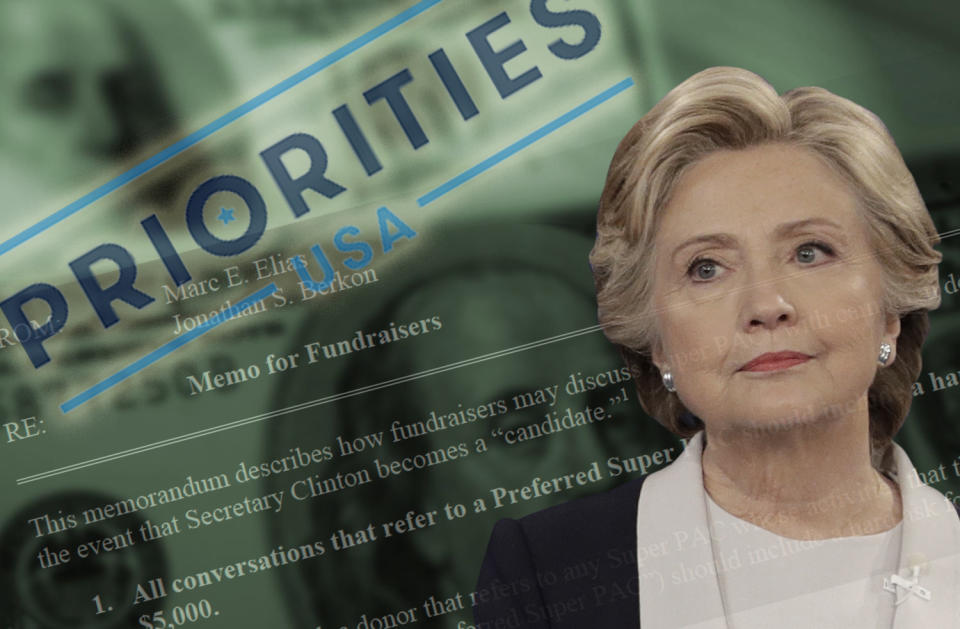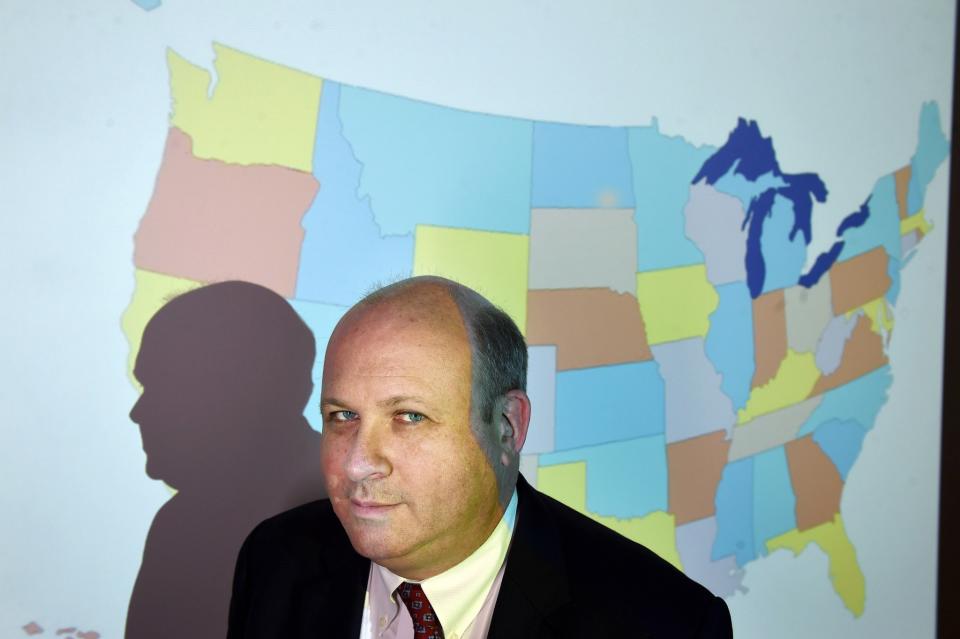Email shows Clinton campaign walking a fine line on fundraising

The day after announcing her candidacy last year, Hillary Clinton flew off to Iowa and, standing outside a small coffee shop, was asked by a reporter about what she had already signaled would be a big issue for her: overhauling the country’s “dysfunctional” campaign finance system to curb the influence of wealthy donors and special interests.
She would soon be announcing her plan to do just that, Clinton replied. But, the reporter followed up, what about the role that Priorities USA Action — a Democratic super-Pac that had announced plans to collect hundreds of millions of dollars from wealthy donors — would have in her campaign?
“I don’t know,” Clinton replied with a shrug, as she walked into the coffee shop to campaign.
How little the media — and much of the rest of the political world — really knew. Among the nuggets from the hacked emails posted by WikiLeaks is new evidence that, from the start, Clinton and her campaign operatives were plotting to aggressively exploit the loopholes in federal campaign laws by steering large sums of unregulated cash into supposedly independent super-PACs like Priorities USA.
Campaign officials spoke of setting up and staffing Priorities USA, arranged to have “big guns” like Bill Clinton featured at its fundraising events and offered detailed instructions, including proposed scripts, on how Clinton fundraisers should urge donors to cut checks for Priorities USA and other officially preferred super-Pacs.
“The [Preferred Super PAC] is doing vital work. You should support them,” Clinton campaign lawyer Marc Elias (and one of his partners) wrote in a March 26, 2015, “privileged and confidential” memo, offering suggested language the campaign’s fundraisers should use when they talk to prospective donors.
Other suggested language: “We cannot win this election without [Preferred Super PAC].” And: “The most important thing you can do right now is support [Preferred Super Pac].”
To be sure, there is nothing illegal about this, at least the way federal election law — which bars campaigns from collecting any more than $2,700 from individual donors per election — is now interpreted. Contacted by Yahoo News, Elias by email directed questions about his memo to the Clinton campaign. Glen Caplin, a campaign spokesman, emailed that the campaign won’t be “authenticating anything being released by WikiLeaks,” given they were the product of a Russian hack. However, he added: “Hillary Clinton has fought for campaign finance reform her entire career and, as president, will propose a constitutional amendment to overturn Citizens United in her first 30 days in office and fight to restore the role of everyday voters in elections. The stakes of this election are too high to unilaterally disarm, and that is why she is so committed to ensuring Democrats have the resources to win.”
The success of this strategy has been dramatically underscored in recent days by reports in the Washington Post and the New York Times documenting how the campaign steered tens of millions of dollars into Priorities USA from such billionaire donors as Univision Chairman Haim Saban, hedge fund manager Donald Sussman and financier George Soros.
On the campaign trail, Clinton continues to decry the influence of Citizens United — the 2010 Supreme Court decision that ushered in the era of super-Pacs, which collect checks from donors, corporations and labor unions in unlimited amounts and then spend the money on campaign ads.
Yet, in one of the more surprising developments in this year’s election, Democrats and the Clinton campaign are now far outpacing Republicans in raising money for these outside “independent expenditure” groups. Democratic super-Pacs, led by Priorities USA, have collected over $200 million for this year’s election — more than twice the amount raised by Republican super-Pacs — giving them an overwhelming advantage in running TV attack ads against Donald Trump and GOP senators in tight election races.
The Supreme Court’s theory behind allowing outside groups to raise unlimited cash is that they would be independent of the campaigns — and therefore the huge six- and seven-figure checks they collected would not be “corrupting” of the political candidates they back.
In practice, however, the lines between the campaigns and the outside super-Pacs have all but collapsed; a deadlocked Federal Election Commission now defines illegal “coordination” between the two groups so narrowly (to involve explicit discussions about particular “messaging” ads) that all sorts of real-life coordination has become permissible. “The law has become a sham,” said Lawrence Noble, the longtime former general counsel for the FEC who now serves as the top lawyer for the Campaign Legal Center, a nonpartisan group that has filed complaints against super-Pacs supporting both Clinton and Trump.
The Elias “memo to fundraisers” vividly illustrates how this has played out in practice — and how campaigns can skirt the rules that were once in place. (Elias, the Clinton campaign’s top lawyer, is an expert on the subject: A veteran Democratic campaign finance guru, he also serves as chief counsel to Priorities USA and most other major Democratic super-Pacs.) His memo offers what Noble calls a “wink, wink, nod, nod,” step-by-step guide for Clinton campaign fundraisers on how to direct large checks into super-Pac coffers and other Democratic Party accounts without running afoul of federal campaign laws.
The key for fundraisers, according to the Elias memo, is to make sure that when they are talking to donors they first make an “ask” for a “hard” money contribution to a super-Pac of no more than $5,000. Asking for the legal or “hard” money limit in advance protects the campaign of being accused of trying to raise “soft” unregulated cash in excess of the legal limits. After that, the memo makes clear, the fundraisers “may speak freely with the donor about the campaign’s support for that Super PAC’s work” — making it clear, as an example, that “Priorities is the preferred Super PAC of the campaign” — as long as they don’t request a specific amount.

The memo even suggests detailed language on how a fundraiser should reply if the donor says, “I have $1 million I want to spend on this election,” and asks where it should go.
The suggested reply: “I want the first $5,400 to go to the [Clinton] campaign. [The $2,700 federal limit applies per election, so a donor could write a check for twice that to the Clinton campaign to cover the primary and the general election.] “The next $33,400 should go [to] the DNC’s main account. The next $70,000 should go the following seven state party federal accounts [then list them.) The next $100,200 should go to the DNC’s building fund account. Finally , you should support [Preferred Super PAC A] and [preferred Super PAC B]. We cannot win without them.” [“State party federal” accounts are joint fundraising committees whose funds are divvied up among the campaigns and state and national parties. The DNC “building fund” is a separate party account to support building renovations and other “infrastructure-related” purposes.]
The language in the Elias memo shows how the Clinton campaign, just like the Trump campaign, is making maximum use of a 2012 Supreme Court decision, McCutcheon v. FEC, that lifted the aggregate $117,000 cap on how much individual donors can give to federal campaigns, political parties and political action committees in one election cycle.
In trying to stay within the letter of the law, the memo makes arcane distinctions such as this:
“It is permissible to provide donors with contact information of a Super PAC representative, so that the donors can execute the $5,000 contribution or learn more information about the PAC if they choose to do so. However, you should not ask donors to take a call or meeting with Super PAC personnel.”
“For example, it is permissible to say, ‘You can call _____________ at ______ from [Super PAC] to find out more information.’”
“But you should not say, ‘___________ from [Super PAC] wants to meet with you. Can you please sit down with her?’”
Such a detailed check list of how to divvy up big money — coming from a candidate’s fundraisers — totally undercuts the principle of having donation limits in the first place, said Noble.
“It’s comical — or it would be comical if we weren’t talking about the state of our democracy,” he said. “The donor doesn’t care what account the money is going into. All he cares about is the presidential candidate is asking for the money.”

 Yahoo Sport
Yahoo Sport 








































